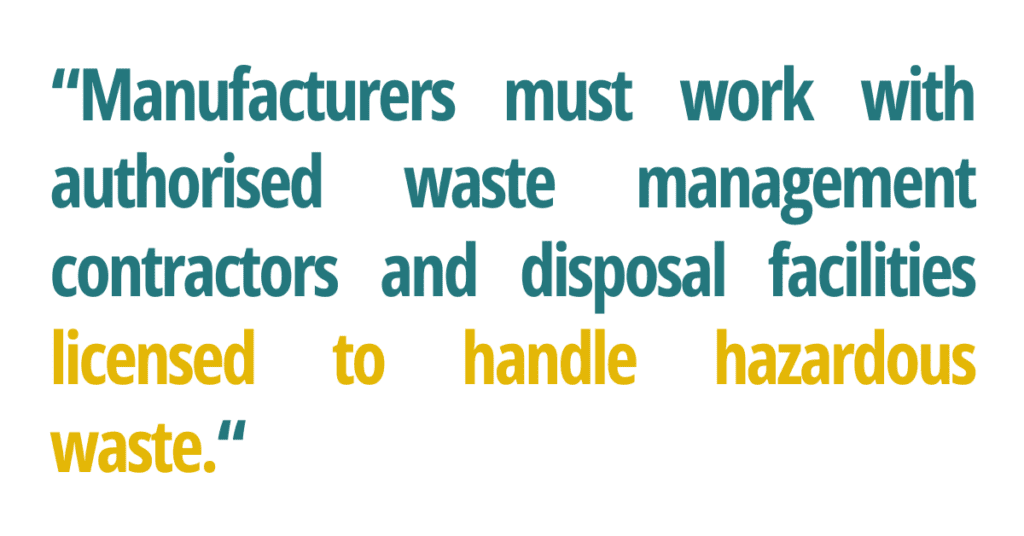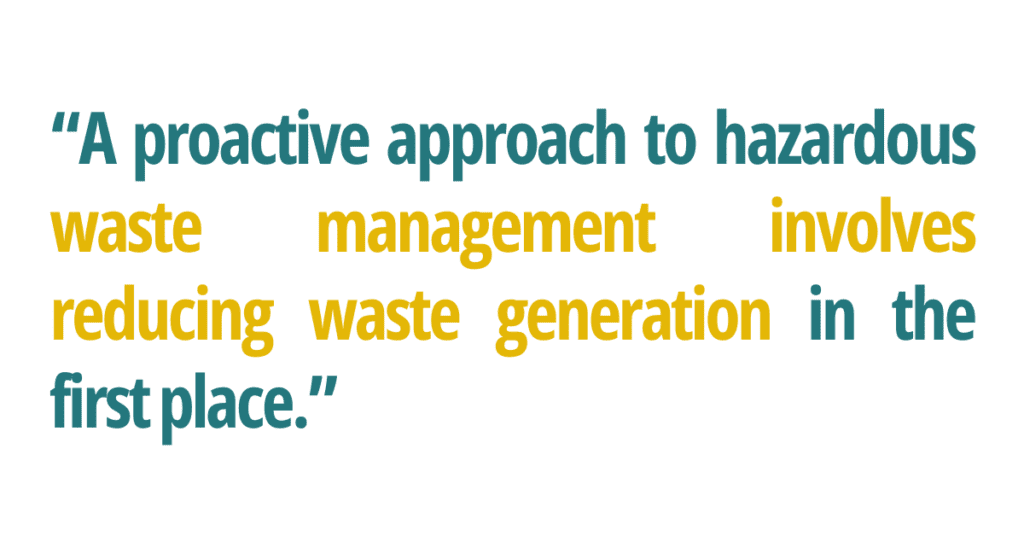
Safe Management of Hazardous Waste in the Manufacturing Industry
The manufacturing industry plays a significant role in the UK’s economy, producing a wide range of products that are essential to our daily lives. With the process of manufacturing there are environmental responsibilities, including the management of waste and in particular hazardous waste. Hazardous waste is waste that poses a threat to human health and the environment if not handled properly. In this article, the Brown Recycling team will discuss the essential steps and regulations for safely managing it.
Understanding hazardous waste
Hazardous waste, as defined by the Environmental Protection Act 1990, includes any waste that poses potential risks to human health or the environment due to its toxic, flammable, explosive or corrosive properties. In the manufacturing industry, hazardous waste can take many forms, such as chemicals, solvents, paints, batteries, electronic waste and more. Identifying and categorising hazardous waste is the first step to properly managing it and avoiding risks.
Waste classification
The initial step in managing hazardous waste is identifying and classifying it. Manufacturers must determine whether their waste falls into one or both of the following categories:
- Hazardous waste: Any waste that has hazardous properties and requires special handling and disposal. For example: asbestos, fluorescent tubes, printer cartridges, waste oils fridge-freezers and computer monitors.
- Non-hazardous waste: Waste that does not pose a significant risk to human health or the environment and can be disposed of according to standard waste management procedures. For example: packaging waste, food waste and construction waste.
Compliance with regulations
The UK has very strict regulations governing the management of hazardous waste. Manufacturers must be aware of and comply with these regulations, including the Hazardous Waste (England and Wales) Regulations 2005, which outline requirements for hazardous waste storage, transportation, and disposal. Failure to comply with these regulations, can result in fines and legal consequences.

Waste minimisation and reduction
A proactive approach to hazardous waste management involves reducing waste generation in the first place. By implementing waste minimisation strategies, such as process optimisation and recycling programs, businesses can decrease the amount of hazardous waste produced throughout their manufacturing processes.

Proper storage
Hazardous waste must be stored in a secure way to prevent leaks, spills and contamination. This requires the use of appropriate containers, all clearly labelled with the type of waste and any associated hazards, ensuring that anyone handling them knows the risks involved and how to avoid them. Waste storage areas should also be designated and equipped with spill response kits in case of emergencies.
Transportation and documentation
When transporting hazardous waste, strict guidelines must be followed to prevent accidents and ensure safe delivery to authorised disposal facilities. Proper documentation, including waste transfer notes, is essential to track the movement and disposal of hazardous waste.
Employee training
Training and education are vital for ensuring that employees are aware of hazardous waste management procedures and safety protocols. Regular training sessions help maintain compliance and reduce the risk of accidents throughout your site.
Reporting
Maintaining accurate records of hazardous waste generation, transportation and disposal is crucial for compliance and transparency. You should ensure your hazardous waste activities are reported to the relevant environmental authorities, as required by law.
Choose authorised waste disposal facilities
Manufacturers must work with authorised waste management contractors and disposal facilities licensed to handle hazardous waste. These facilities are equipped to safely treat, recycle or dispose of hazardous waste in compliance with regulations.
Brown Recycling are authorised hazardous waste disposal experts and offer a dedicated service for businesses of all sizes. Whether you need waste removal immediately, have a specific challenge to address, or a free audit of your current waste management processes with expert recommendations, we can help.

Ensuring compliance
Understanding and complying with the regulations for hazardous waste can be a complex business. At Brown Recycling, we have been providing hazardous waste management services to manufacturing companies throughout Staffordshire and South Cheshire for decades.
As experts in commercial waste management, and authorised hazardous waste disposal providers, we advise businesses on the most efficient and effective approach for their specific waste, put the right containers and processes in place and ensure all waste is handled and disposed of safely and compliantly.
If you would like to learn more about how we could help improve the safety of your site and optimise your hazardous waste management processes, give us a call on 01782 816 520, or contact our customer support team at [email protected].
This website uses cookies to enhance your browsing experience and deliver personalised ads. By clicking “Accept All Cookies”, you agree to the storing of cookies on your device to enhance site navigation, analyse site usage, and assist in our marketing efforts.

